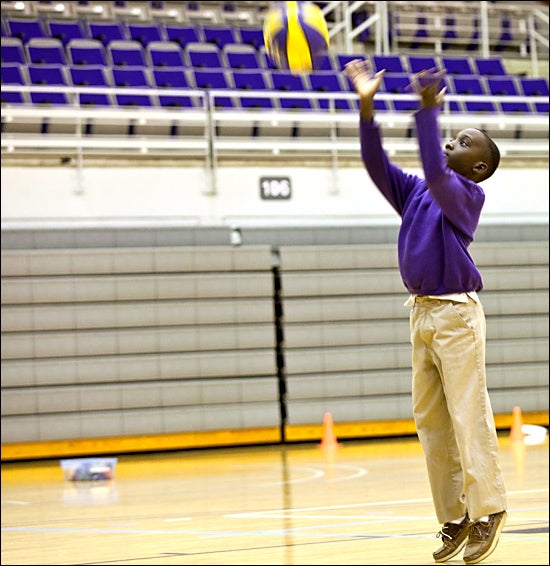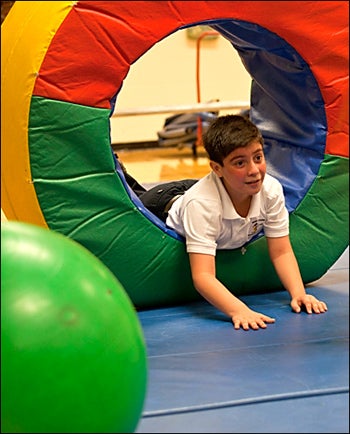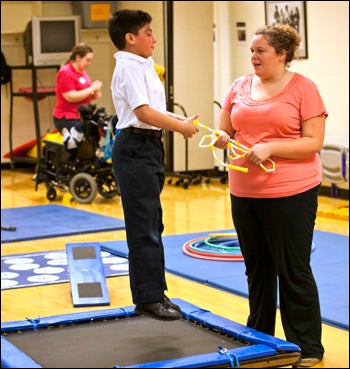EVERYONE IN THE GAME
ECU program opens exercise to all

Pitt County student Tolbert Wangila shoots baskets at East Carolina University. Wangila is participating in ECU’s adapted physical education program, which helps ECU students learn how to meet the physical education needs of children with disabilities. (Contributed photos by Chuck Baldwin)
On a basketball court at East Carolina University, 9-year-old Tolbert Wangila gets a firm grip on the ball, bends forward, manipulating his legs, arms, and wrists for a smooth release.
Faster and faster he goes, counting the number of shots he makes, while an ECU student monitors his progress.
Numbers are important to Wangila, who has Autism Spectrum Disorder. His goal today is to increase the number of baskets he makes.
Wangila is one of 50 Pitt County children participating in the ECU adapted physical education program. The program teaches ECU students best practices for meeting the physical and motor fitness requirements of children with disabilities. At the same time, children and educators in the Pitt County school system benefit.
Training Future Leaders
The program pairs ECU undergraduate and graduate students with Pitt County children in a controlled and supervised environment. The on-campus practicum provides training for future physical educators, adapted physical educators, recreational therapists, special educators and other allied health professionals.

Pitt County student Gabriel Flores enjoys play during the ECU adapted physical education program.
Professors Jim Decker and Boni Boswell of the Department of Kinesiology in the College of Health and Human Performance include an adapted physical education practicum in three relevant courses.
“Students make a connection, one human to another. They may forget my lectures, but they will never forget who they worked with in the practicum,” Decker said.
ECU sport and exercise psychology student Courtney Frueauf of Missouri worked in the practicum to identify specific needs and create an individualized education plan for the public school teacher she assists. At the end of the course, she will hand over the plan to the teacher.
“Physical activity and exercise is for everyone. It is important that as professionals, we learn how to adapt physical activity and exercise for people with special needs,” Frueauf said.
Adapted special education major Hayley Goff has found it helpful to gain practical experience through the program. “It’s the first time I’ve been assigned to only one student, creating lesson plans solely on that one child,” she said.
David Liebfreund, special education teacher and teacher of the year at Wahl-Coates Elementary School, works with Wangila in the ECU program.
“One session working hands-on with these children will teach more about students with Autism than any course or textbook ever will,” he said.
Helping the children
Liebfreund said Wangila, who is beginning his fourth year of participation at ECU, loves numbers, geography, and learns things rapidly. Populations and the different languages people speak fascinate him.
He also enjoys his weekly visits to ECU. But not always.
“The first year we took him to ECU, he would simply shut down and say that this is too hard,” Liebfreund said. “He was even absent on some of the days we were scheduled to visit ECU and he never misses school.”
With an incentive reward-based system Liebfreund established, gradually Wangila started to participate. He began by walking around and counting the seats in the arena looking for specific numbers in the seats.
Last year was a turning point for him, Liebfreund said. Wangila began new activities including basketball and cycling.
“He has come full circle,” said Liebfreund. Now he looks forward to participating and working with his new friends.
Liebfreund has worked with the ECU program for five years. He said the program provides an excellent outlet for the children to socialize and communicate with others.
“Students with Autism often have deficits in communication skills and this class helps them to open up to someone other than me or their parents,” he said.
ECU professors Decker and Boswell agreed.
Decker said it is important for teachers, parents and siblings to include children with disabilities in their activities, while emphasizing ability rather than disability.
“That in turn builds confidence,” Decker said.
Supporting local educators
Decker and Boswell have long been advocates for facilitating better adapted physical education programs in Pitt County Schools. This advocacy has promoted awareness and highlighted a genuine need.
While the program at ECU provides an extra-curricular experience, it does not take the place of the physical education that all public schools must provide for exceptional children. ECU’s program served as a catalyst for Pitt County’s specially designed education program, said Pitt County’s Exceptional Children’s Program director Cathy Keeter.
“Without Dr. Decker’s support, our program would not exist,” she said.
In 2009, Pitt County Schools hired ECU health and physical education graduate Lara Brickhouse as the certified adapted physical educator for Pitt County Schools. Now the school system has three adapted physical education teachers, all ECU alumni, who serve almost 300 students with special needs in 27 schools.
“The ECU practicum experience has brought awareness regarding students with special needs within our county and the importance of including physical activity in their lives,” Brickhouse said.
“It affords children with special needs the opportunity to get out into the community and interact with persons outside of their school setting,” she said.
###

ECU student Hayley Goff of Walstonburg works with Gabriel Flores in the adapted education program.